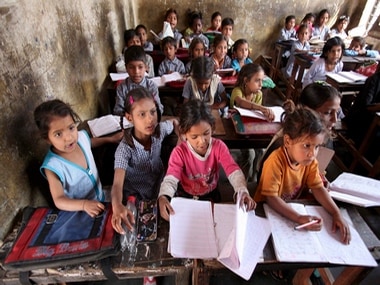Editor’s note: The draft New Education Policy, which intends to introduce broad reforms, is now open for public scrutiny. In this three-part series, Firstpost examines the structural efficacy of the proposed policy. This is the first part of the series.
“When was the last time you used a quadratic equation in your life?”
I have not used it in at least seven years. I am not suggesting that learning quadratic equations is not important, because it is, for a small set of people. But why is every child grilled through the same, then?

Representational image. Reuters
Looking back, I would have benefited more if the school years taught me how my identity shapes my actions, how I may have been less misogynistic (#YesAllMen), handing rejections without being harsh on myself, normalising writing gratitude letters and learning to disagree without being bitter or losing the fondness for the other.
I believe I would have benefited more by combining music and science, history and physics, and computers and environment. I think others too would have benefitted from these. Instead, we were learning quadratic equations’ formulas.
It is in the context of such a disconnect between our individual as well as collective needs that having examined the specific provisions of the policy, I zoom out to examine the broad principles and approach of the New Education Policy.
New Education Policy is a piece of mixed news. It has its fair share of good news and a fair share of areas where the committee disappoints.
Several studies including the Annual Status of Education Report (ASER) shows that more than 50 percent of our class 5 children are unable to read the basic text and perform basic arithmetic. This is a national emergency that is neither adequately discussed nor acted upon. With the majority of the children unable to read basic text, it is difficult to predict the future of these children or India because there does not seem to be one.
In that context, the New Education Policy lays emphasis on building foundational literacy and numeracy. The policy goes on to recommend sound measures such as dedicated time for foundational skills, reviewing textbooks for primary grades, redesigning teacher education modules to reorient focus towards building foundational skills, among others.
The committee acknowledges that the syllabus currently imposed on students is unwarranted. Harvard professor Lant Pritchett has demonstrated negative consequences of overambitious curricula.
Ours is not only ambitious but disconnected. Recall the last time you used trigonometric equations? He showed that two countries with exactly the same potential learning could have massively divergent learning outcomes just because of a gap between curricular and actual pace—and the country which goes faster has much lower cumulative learning.
Ironically, the learning could go faster if curriculum and teachers were to just simply slow down, the research proved. Therefore, the recommendation of the committee to reduce the content curriculum making space for critical thinking and the arts is a progressive step forward.
The policy, however, falls short of establishing the connection between our national needs with that of its proposals. One of the most significant challenges our democracy faces today is the menace of fake news. The responsibility of building citizens that can identify the difference between fake and real news, facts and fiction, campaign and propaganda lies in our schools. The menace is eating up our democracy with no foreseeable sign of it relenting. In that light building institutions that can resist and counter to this menace is the key responsibility that the committee has failed to even take into account.
The committee that drafted the New Education Policy did not have a single school teacher in it. One is unable to understand the reasons and explanation for it if there can indeed be any. There are nearly 80 lakh teachers in India and they remain the most important unit of effecting changes proposed in the policy. Without their involvement and considerable say in the making of the New Education Policy, it remains to be seen as to how the teaching community responds to it. The fate of the No-Detention Policy is well-known because the teachers did not want it. Within two years of Right to Education, a review committee was set up and within seven years, the provision has been diluted significantly.
Not one school teacher can be found in the list of 217 eminent persons the committee consulted. However, the committee rightfully laments the loss of prestige of teachers and its approach provides evidence for it.
The author works as a Secretary-rank officer in Delhi Commission For Protection of Child Rights (DCPCR), Government of Delhi.
Your guide to the latest cricket World Cup stories, analysis, reports, opinions, live updates and scores onhttps://www.firstpost.com/firstcricket/series/icc-cricket-world-cup-2019.html. Follow us on Twitter andInstagram or like our Facebook page for updates throughout the ongoing event in England and Wales.
[“source=firstpost”]
